Free sunflowers, Free wood chips, Garden beauty! Good day to you! Today's post is a gallery of highlights from the past month. We're having an exceedingly rainy spring. We're so grateful for our two biggest greenhouses which have allowed us to plant and harvest, long before we'd be able to outside. We've had beautiful and heavy blooms on all our fruit trees but we've also had some late frosts, and the rains inhibit pollinators from flying so it remains to be seen how much fruit has actually set. Here are highlights from the past month:
This year Chris has done an amazing job of starting seeds right in the raised beds of our greenhouses. This has given us a head start on many of the cool-weather crops. So far we've been eating (and sharing) lettuce, kale, radishes and green onions and have just begun to thin the carrots. In coming weeks we'll add spinach and beet greens to the mix as well.
 |
Chris planting celery with Aldrix. Peas are beginning to flower in the background...yum!
|
Llyn, meanwhile has been starting the other crops in pots for later transplanting.
This is the fourth season we've grown all our starts with soil we made
ourselves and they're looking beautiful!
 |
| Broccoli 'starts' grown in home-grown potting mix which consists entirely of compost generated in the
paths of our greenhouses, coffee grounds, wood-ash and perlite (the
only ingredient we've had to purchase). |
Growing plants without concentrated soil-amendments/fertilizers or animal by-products means
the plants grow more slowly but they also seem to be more resistant to pests and
diseases. They are also more nutrient-dense since they don't have as
much water-weight.
All the garden's fertility comes from leaves, grass, vegan kitchen scraps, wood ashes and coffee grounds. LINK - For more info on veganic/organic growing.
So far this season, most of the surplus produce has gone to programs housed in the church that shares our parking lot. They have a Gleaners group, a distribution to the Seniors in our community and a Food Pantry open to anyone in our school district who meets basic income requirements.
To these food charities, we've added another group: the Stone Soup Kitchen in Corvallis. The Stone Soup Kitchen (sponsored by St Mary's Catholic church) is a charity that serves three meals a day, every day of the year! In 2021 that was an average of 3,500 meals/month but in March of this year they gave away over 4,000 meals! We feel really good about donating to them.
Because they cook/prepare our food into actual meals, we feel it is
more likely to actually be eaten and go to benefit those who typically
have the least access to organic, fresh veggies or the means/ability to
prepare them themselves. Stone Soup Kitchen in Corvallis - LINK.
Volunteers: Our share-giver (volunteer) days have shifted to Mondays and Fridays. Since we no longer have CSA boxes to fill (on Wednesdays), it works best to spread these days of community-help and harvests throughout the week. We have a good circle of support already committed for the summer but if you're really eager to get involved, send us an email and we'll see if we can find enough weeds for you to pull too (or maybe we'll plant some! haha). All share-givers learn about our methods of growing organically/veganically - from starting seeds, through the harvesting of fruits, vegetables and seeds for future years' plantings, AND they share in the weekly harvests.
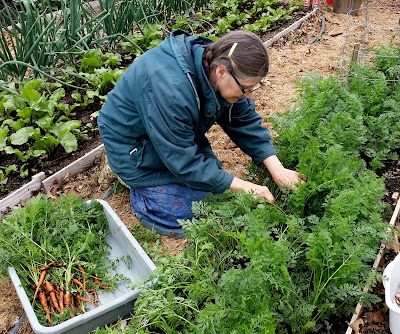 |
Cindy Kitchen (thinning carrots) has been coming since 2010 ...
|
 |
...along with her husband Jim (tying up green onion bunches to share).
|
 |
Donn, another long-term helper, spreading grass donations in the greenhouse paths. All this organic matter helps us create soil and compost for next year's fertility.
|
 |
Jenny Hicks, a new friendly face; weeding the garlic patch.
|
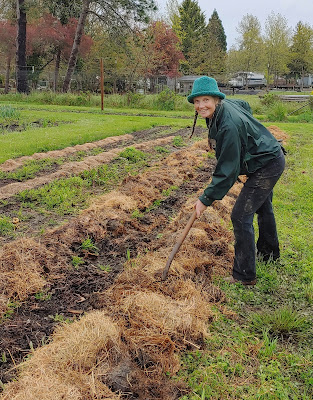 |
Llyn, in the rain, spreading donated wheat-straw to mulch our cucumber patch.
|
 |
Suzanne, another new garden-friend, re-potting sunflowers.
|
 |
Rook's still with us, entering his fifth season.
|
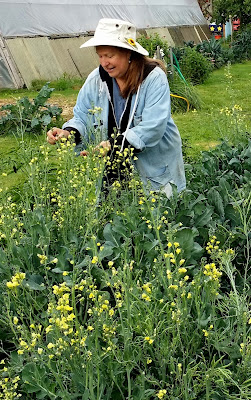 |
Sandra, in her second year, picking broccoli.
|
OSU Service-Learning is back! Oregon State University, in Corvallis has a unique offering through many of their classes. Students are asked to volunteer in the community and create a poster or slide-show describing their experience. For this they receive college credit. A typical
Service-Learning group consists of 4-6 students for four hours. We had two groups in April of this year, our first since February 2020. It was wonderful to have them back!
 |
| OSU Service Learning group, April 9th, 2022. The students always bring such positive energy into the gardens! |
They help us with a variety of tasks...This year:
 |
Students turning a compost pile...
|
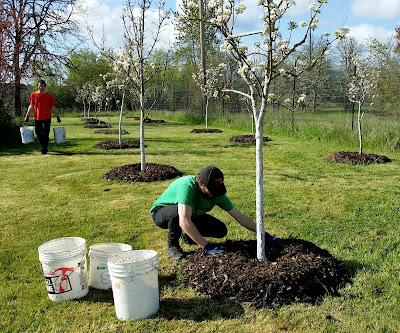 |
Spreading wood-chips at the base of our orchard trees.
|
The first group planted two rows of potatoes... |
They did a beautiful job of planting...Hopefully the April rains haven't drowned the plants.
|
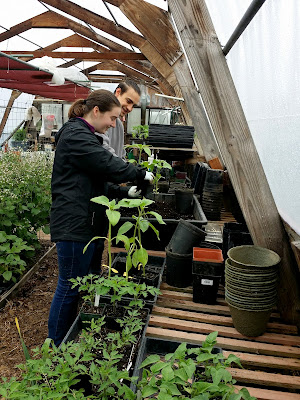 |
Students re-potting sunflowers.
|
Sunflower plant Giveaway: Sunflower-pollen has the unique ability to protect certain types of bees
from two types of parasites. They also provide food for many birds and
the seeds can be harvested to eat or grown into sprouts.
We've grown over 50 sunflower plants, both Autumn Beauties and Mammoth Russians to give away. The Autumn Beauties are from seed I (Llyn) harvested from a volunteer plant at our town's library a few years ago. So, as a way of giving back, and expanding our area's 'community' of sunflower plants:
We'll be giving away sunflowers through a collaboration with Monroe's Community Library.
 |
Mammoth Russians
|
Come to Storytime on Monday May 9th 10:30 am (380 N 5th St. Monroe, OR - 541-847-5174) for kid's stories about sunflowers, and the Give-away.
Don't worry if you can't make it to Storytime, we're bringing plenty of plants and will leave them at the library till Thurs. May 12th so you'll have a few days to pick them up.
To learn Why growing Sunflowers is great for Bees...and how to grow and process sunflowers for birdseed and sprouts, CLICK HERE.
 |
Autumn Beauty sunflowers
|
 |
| Our outdoor sunflower nursery: saw horses under the swing-set (till the kids come back this summer to reclaim it!) |
|
|
Wood chips galore! A local tree-service company has chosen to make our parking lot their favorite place to dump wood-chips to share with the community.
Bring buckets, totes or an empty pick-up truck bed! First come, first served. If you miss the current load, check back later as they'll be sure to drop off more.
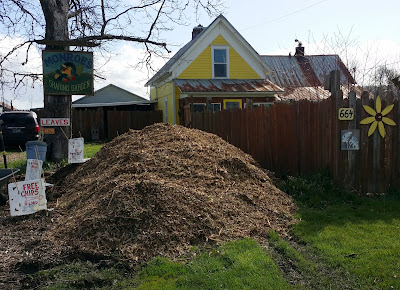 |
Come and get 'em!
|
And lastly, here are a few pictures showing the garden's seasonal progress...
 |
Planting fruit trees...
|
 |
Pruned grape vines
|
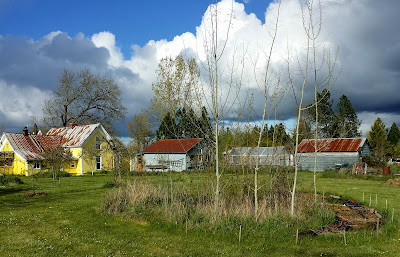 |
A beautiful April sky at the Sharing Gardens.
|
Llyn's Mom sent us
THIS LINK to an episode of Nature entitled "My Garden of a Thousand Bees". It is an absolute delight! A nature photographer during Lockdown films a full spring and summer
season of native bees in his unruly backyard garden in London. The
photography is amazing; the bees come to have individual personalities
and the photographer is funny and humble as he explores this
micro-world.




































